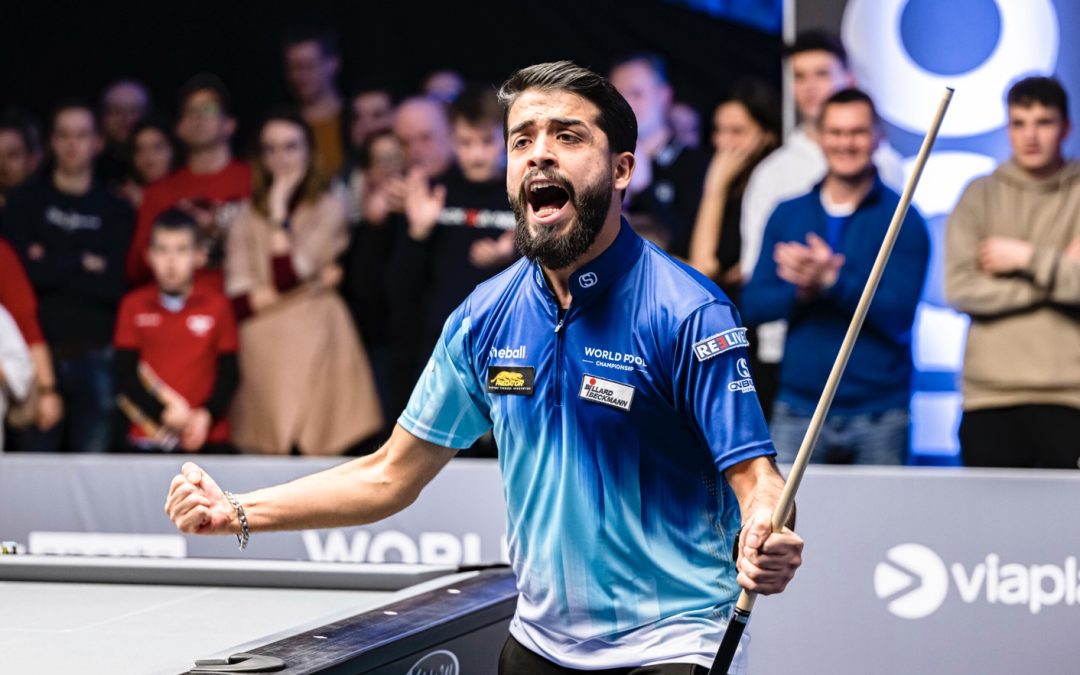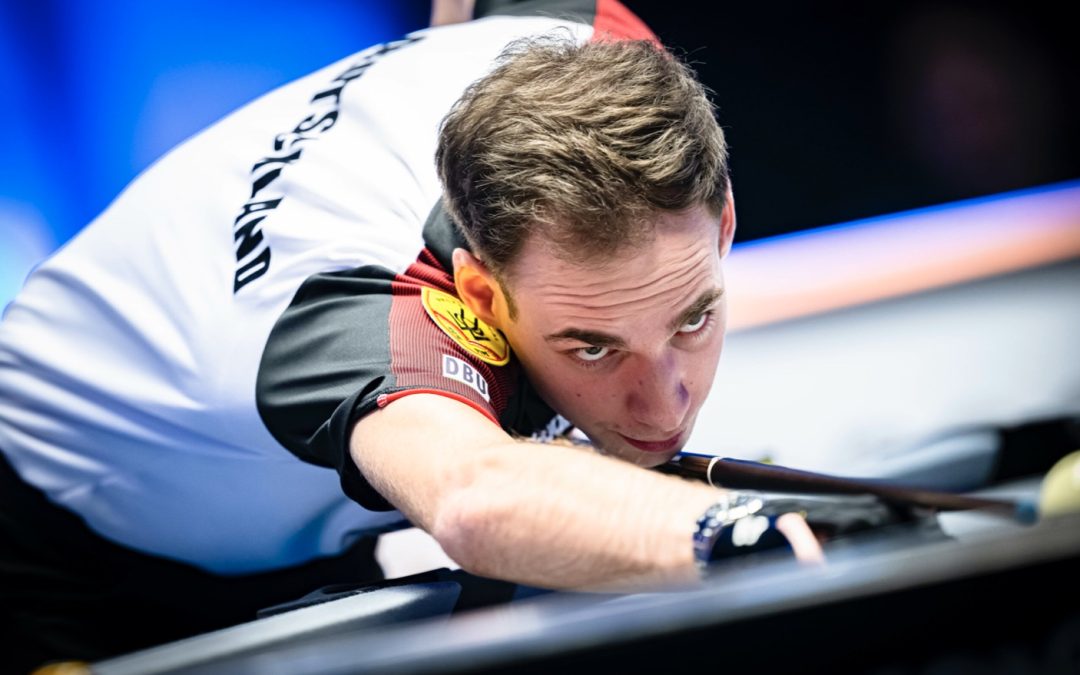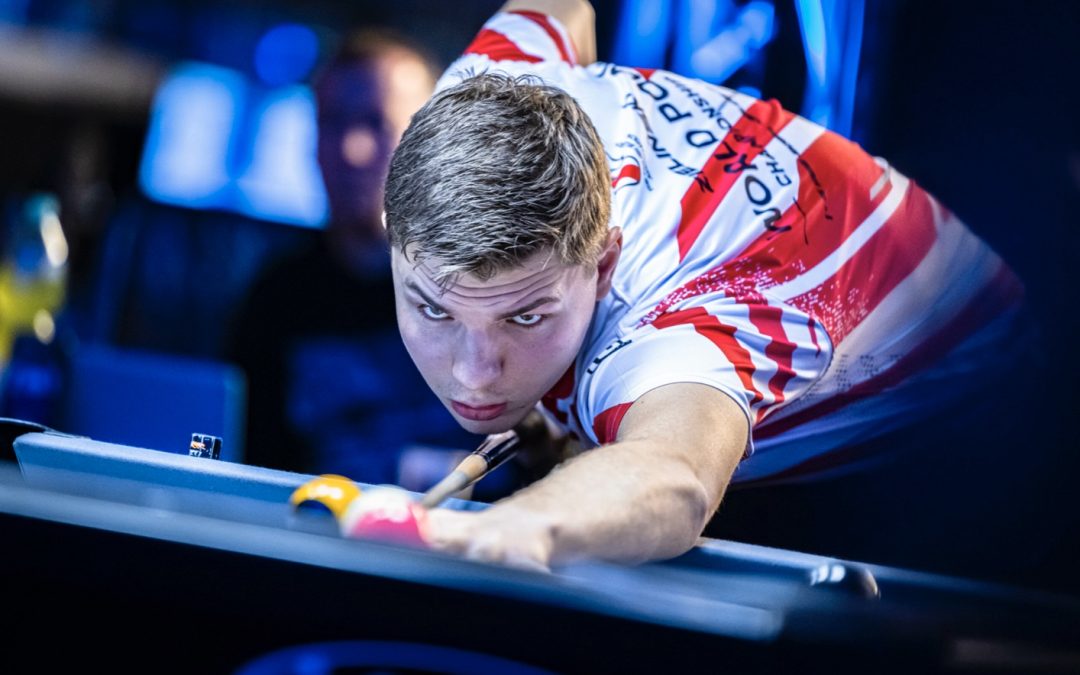STORY BY TED LERNER
(COURTESY OF BILLIARDS DIGEST)
THE DAY after Francisco Bustamante won the World 9-ball Championship in Doha, Qatar, in June, he received a text message on his cell phone from none other than the President of the Philippines, Benigno “Noynoy” Aquino III. The president, himself an avid pool player from Bustamante’s hometown, had just been sworn in to a six-year term in office. Despite a hectic schedule and many pressing problems besetting the nation of 90 million people, the new president took a few moments to send the newly crowned world champion a message.
“This is Noynoy Aquino here,” the text read, “saying congratulations to your success and honor that you have given our country.”
“I’m very happy that I received recognition, especially coming from President Noynoy,” a clearly overawed Bustamante said afterward. “I am not intending to ever erase that message. It’s like a double whammy. Winning the world championship for the first time, then getting a message from the president of the Philippines.”
Several weeks later, however, an unsuspecting Bustamante would be hit with a triple whammy. While engaged in a money match in a Manila poolhall, he received a phone call from the United States informing him that he had just been elected to Billiard Congress of America Hall of Fame.
“I was surprised, shocked,” Bustamante said of that moment. “I’m so happy. It’s not something I asked for. There are too many good players. It’s a big honor, especially to be elected in the USA.
“For me, that’s a dream. I come from a small town in the Philippines. I never thought I would one day be in the Hall of Fame for pool.”
A world title. A text from your president. And now the ultimate honor representing eternal greatness, the BCA Hall of Fame. For the humble and soft-spoken 46-year-old, it’s been a rapid succession of good news that’s difficult to comprehend.
“I don’t know what to say,” Bustamante responded, when asked what it all meant to him. “I’m very happy. I’m just lucky.”
A man of few words, Bustamante has always chosen to do his talking on the green pitch, and the results from his nearly two-decade professional career speak loud and clear. Since 1991, Bustamante has captured some two dozen tournament titles and a slew of big invitational victories. He’s twice been named Billiards Digest Player of the Year, taking the honor in 1998 and then again in 2002. This year, after shouldering the burdensome moniker of the best player to never win a sanctioned world title, Bustamante finally filled that hole in his resume by winning the WPA World 9-Ball Championship.
Over the many years, he has built up a legion of fans, awed by his massive break shot, flowery stroke, humble demeanor and ready smile for everyone who comes his way. He now stands aside the only other Filipino to be elected to the Hall of Fame, his close friend and traveling partner Efren Reyes.
Fans may be tempted to view Bustamante’s induction as a chance for him to finally step out of the long and lofty shadow cast by Reyes. The humble Bustamante, however, sees things differently. He enjoys standing in his good friend’s powerful glow and is happy to stay there. Bustamante has never expressed anything but awe for Reyes – and continues to do so two decades since striking up their friendship.
“Efren is my friend, my compadre and my idol,” Bustamante said. “I understand it when the fans root for him. I’m not surprised. He’s the best player in the world. He’s a beautiful guy and friendly with everyone.”
Nobody would begrudge Bustamante the obvious fact, however, that he has carved out his own niche and his own standing in the pool world. And like Reyes, his near impossible journey from the bottom rungs of third-world poverty to the highest levels of the sport is an integral part of his legend.
Dreaming about anything other than daily sustenance is a fanciful extravagance few can afford in the impoverished barrios of the provincial Philippines. Money is tight and opportunities are slim. If you are lucky to find a good gig, something that generates a few extra pesos, you stick with it. This is why you often hear guys like Bustamante and Reyes say they “got lucky,” after an incredible win. Considering how they grew up, every day was pure chance.
The youngest of eight children, Bustamante nonetheless recalls a simple and happy childhood in a small village in the town of Tarlac, four hours north of Manila. It was in the streets where Bustamante received his now-famous moniker, “Django.” His tough-guy attitude and noir look, along with the lit cigarette always dangling from his mouth, reminded neighbors of the gunslinger character made famous by Italian actor Franco Nero.
“Cowboy movies were very popular then,” Bustamante said. “People looked at me when I would play [with] no shoes, and I smoked. I hated losing, so I would challenge friends to fistfights. People said I was like Django, and the name stuck.”
His father eked out a meager living building makeshift toilets out of cement and planting rice. Bustamante seemed destined to follow in his father’s footsteps, finding himself in the rice fields, bent over under the scorching tropical sun, knee deep in mud, planting seedlings for small pocket change.
His first brush with the game that would quickly become his life’s calling came when he was 12 years old. His sister owned a small canteen in a busy area of town next to a large open-air poolhall, where jeepney drivers waiting for fares and various hustlers would play money games for hours on end. Fascinated by the colorful balls, the intense action, the poolroom banter, but especially the money changing hands, Bustamante visited the poolhall daily. He would rack balls or act as the referee for the money matches, for which he’d make small tips.
“When I was a spotter,” Bustamante said, “I figured I could make some money from playing. So I played every day. There was a lot of action at the poolroom and I’m thinking, ‘Oh, pool is easy money.'”
The choice between fast cash and staid books was easy for the youngster, and he quit school after the seventh grade.
“I didn’t like going to school,” Bustamante said. “It wasn’t my style. Once I knew I could make money playing pool, that’s all I wanted to do. I just wanted to get better and stronger.”
Late at night, when the crowds disappeared and his spotting duties were finished, Bustamante would grab a house cue and practice alone. He was soon playing and winning small-time money matches. At 15 years old, he entered and won a local tournament in Tarlac. At 16, he was beating known players in nearby towns. By his early 20s, he was unbeatable in his area, so a friend took him to Manila, where this unknown kid from the north made even more money for himself and his backer.
“If you wanted to improve your game,” Bustamante said, “you had to come to Manila because all the good players were there.”
Eventually Bustamante became immersed in the big city’s top-level money-game scene, which was unrivaled in the mid-1980s. With tournament opportunities non-existent at the time in the Philippines, greats like Reyes, Jose Parica and a slew of other massive pool talents battled it out deep into every night in sets of 15-ball rotation for sums big and small. Nobody had jobs except to play pool. If you didn’t win, you didn’t eat that day. It was a brutally tough environment that helped forge the Filipino players’ amazing talent and made them so tough to beat.
“I like action,” Bustamante said. “Gambling in pool makes you strong. It builds your heart, your nerves, and you get the experience. … There are a lot of good players in the Philippines. And everybody’s hungry.”
Making it beyond the Manila poolroom, however, was still an impossible dream for most. Reyes, who had met Bustamante a few times but would only become close to him in the early 1990s, said one of Bustamante’s secrets then was that he paid attention to the greats around him.
“He saw a lot of the good players in Manila,” Reyes said. “People nobody ever heard of. He watched them and copied them, how they pocketed balls, how they moved the cue ball.”
Even so, fortuitous luck was still an essential ingredient to upward mobility. That came in 1991, when a Filipino friend took Bustamante to Europe to play in some tournaments. After playing in an event in Switzerland, the pair was driving through Germany when they stopped at Rick’s Cafe, a poolhall in the town of Kiel, near Hamburg. The owner, an Indonesian, immediately fell in love with Bustamante’s style on the table. Bustamante suddenly became the house pro, complete with a handsome salary, room and board, and money to travel to tournaments throughout Europe and even to the U.S. and back home to the Philippines. It was a productive gig he ran with for over a decade.
“In Germany I slept good, I ate good, I made money and I practiced every day,” Bustamante said. “I was only 29 years old so [I was] in good shape then. ”
Bustamante’s presence lit up the entire pool scene throughout the Continent. Veteran Oliver Ortmann recalls that, when Bustamante first came to Germany, the buzz about this unique Filipino spread quickly amongst Europe’s pool community.
“His style was totally different than any European player,” Ortmann said. “He came out with shots nobody knew to come up with. He did safeties you wouldn’t even think about. He had this really powerful break shot. To beat Bustamante at that time was to beat the best in the world. He was like a hero to us in Europe. He really helped grow pool in Germany and in Europe. Everyone was talking about him.”
With Germany as his base, Bustamante soon headed to the Promised Land for all Filipinos, the United States, making his tournament debut in 1992. Noted tournament director Jay Helfert recalls that once word got around about this new Filipino player on the scene, his mere presence in a room had everyone paying rapt attention.
“Back then he used to have long hair,” Helfert said. “He’d wear all black. He was scary. We’d say, ‘Here comes Dracula.’ He sucked the blood out of the American pool players’ pockets. And he had the most powerful break anyone had ever seen. That was a huge advantage.”
“I don’t know where that break comes from,” Bustamante said, laughing. “People in the States used to ask me how I got that big break and I tell them, ‘I guess it’s because I eat a lot of rice. It makes me strong.'”
And Bustamante, whether in money games or in tournaments, was always dead serious about taking care of business. “Although Francisco has always been a friendly guy, he wasn’t really there to make friends,” Helfert said. “He came to win and to win money. He saw other players as rivals. He was there to match up. He had so much heart and courage. Francisco was fearless and not afraid of anyone.”
Nobody was surprised when Bustamante finally broke through and won two Camel Tour events in 1997. But the following year, he took his game to another level, winning four major tournaments in the U.S. and capturing his first BD Player of the Year award. For the next few years Bustamante continued traveling the world and winning consistently. Then in 2002 his exploits cemented his rarefied status among pool’s all-time elite. It started in the knockout rounds of the World Pool Championship in Cardiff, Wales, when Bustamante received a nightmarish call from his wife, Mila, back in the Philippines, telling him that their 7-month-old daughter had contracted a viral infection and suddenly died.
“When my wife called me, I just wanted to quit and go home,” Bustamante said. “But my wife and Mr. Puyat (his sponsor) told me, ‘If you come here there’s nothing you can do.’ So I play[ed] for my daughter.”
In the match right after he found out his daughter had died, however, he looked listless and uninterested. He trailed 10-6 in a race to 11 against Antonio Lining, who was breaking for the match. But Lining broke dry and Bustamante ran out – and then won the next four racks for a miraculous victory. That was the spark for one of pool’s most inspirational runs, which ended in a heartbreaking 17-15 loss to Earl Strickland in the final.
Perhaps even more incredible, Bustamante was able to turn the death of his daughter into a motivational force. Instead of moping, he spent the rest of that year winning everything in sight. From Japan to the Philippines to Germany to the U.S., he won seven titles and his second BDPlayer of Year award. Bustamante chalked it up to his daughter looking over his shoulder.
“Maybe my daughter wants me to win,” Bustamante said. “I’m thinking it was her that gave me the power.”
The pain of that tragic event has passed with time, but with three young kids with Mila and three grown kids from a first marriage, as well as an extended family that he looks after, Bustamante has no intention of slowing down. He had several relatively off years in the mid-2000s, but in the last two years, he has found his mojo once again. And with a string of recent good news, he has more than enough reasons to continue doing the very things that have brought him to the BCA Hall of Fame.
“I’m still fighting to make money,” Bustamante said. “How can I quit? I have to earn a living. It’s my only talent. It’s my job. I have to do this by myself. I take it very seriously. So long as I can play, I’ll stay in the poolroom all my life.”
And without a doubt he’ll be sharing the stage with his longtime buddy, the first Filipino to make it the sport’s most exclusive club, who couldn’t be more pleased for his younger protege.
“I’m happy for him,” Reyes said. “And I’m happy also that he is joining me in the Hall of Fame.” The Magician then smiles that famous toothless grin and gives a unique twist on his famous phrase.
“We’re both lucky.”
You can contact Ted Lerner at tedlerner@gmail.com
With Thanks to Billiards Digest Magazine









